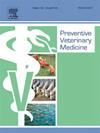Can badger vaccination contribute to bovine TB control? A narrative review of the evidence
IF 2.2
2区 农林科学
Q1 VETERINARY SCIENCES
引用次数: 0
Abstract
In parts of Europe, the European badger Meles meles acts as a wildlife host for Mycobacterium bovis, the causative agent of bovine tuberculosis (bTB). Options for reducing the risk of transmission of M. bovis from badgers to cattle include biosecurity measures, culling, and vaccination of badgers using the BCG vaccine. The use of vaccination as a control measure for tuberculosis (TB) in badgers has increased in recent years, with large-scale deployment in Ireland, and increasing use in England alongside a gradual phasing out of badger culling. Here we review evidence relating to the use of badger vaccination as a tool for controlling TB in badgers and cattle. Vaccination reduces the severity and progression of TB in badgers experimentally infected with M. bovis in laboratory studies, and significantly decreases the likelihood of naturally-acquired infection in free-living badgers in field trials. Modelling studies evaluating different strategies for controlling TB in badgers predict that badger vaccination will reduce TB prevalence in badger populations and lead to corresponding reductions in cattle herd disease incidence. While large scale field trials have not been undertaken to quantify the level of impact of badger vaccination on cattle bTB incidence in the UK, field studies in Ireland suggest that in some situations badger vaccination can result in beneficial disease outcomes in cattle which are comparable to those from badger culling. Attitudes to badger vaccination vary among stakeholder groups. Although members of the public are relatively positive about the benefits of vaccination, farmers are generally negative, due to concerns about practicality and effectiveness, along with a view that badger populations need to be controlled. The evidence published to date indicates that badger vaccination has the potential to contribute to the control of TB prevalence in wild badger populations and to form part of a wider strategy for controlling bTB. Future research should focus on investigating the effect of badger vaccination on bTB in cattle, along with understanding the impacts of vaccination in badgers in a broader range of ecological settings. Further understanding of the drivers of negative attitudes towards vaccination will nonetheless be crucial for incentivising and increasing the deployment of badger vaccination.
獾疫苗是否有助于控制牛结核病?对证据的叙述性回顾
在欧洲部分地区,欧洲獾Meles Meles是牛分枝杆菌的野生宿主,牛分枝杆菌是牛结核病的病原体。减少牛分枝杆菌从獾传播给牛的风险的备选办法包括生物安全措施、扑杀和使用卡介苗对獾进行疫苗接种。近年来,接种疫苗作为控制獾结核病(TB)的措施有所增加,在爱尔兰进行了大规模接种,在英格兰也越来越多地使用疫苗,同时逐步取消了对獾的扑杀。在这里,我们回顾了与使用獾疫苗作为控制獾和牛结核病的工具有关的证据。在实验室研究中,接种疫苗可降低实验性感染牛支原体的獾的结核病严重程度和进展,并在田间试验中显著降低自由生活的獾自然获得感染的可能性。评估控制獾结核病的不同策略的建模研究预测,獾疫苗接种将降低獾种群中的结核病患病率,并导致牛群疾病发病率相应降低。虽然在英国还没有进行大规模的实地试验来量化獾疫苗接种对牛bTB发病率的影响水平,但在爱尔兰的实地研究表明,在某些情况下,獾疫苗接种可以在牛身上产生有益的疾病结果,与獾扑杀的结果相当。利益相关者群体对獾疫苗接种的态度各不相同。尽管公众对接种疫苗的好处持相对积极的态度,但农民普遍持否定态度,因为他们担心疫苗的实用性和有效性,同时他们认为獾的数量需要得到控制。迄今公布的证据表明,獾疫苗接种有可能有助于控制野生獾种群中的结核病流行,并成为控制bTB的更广泛战略的一部分。未来的研究应侧重于调查接种獾疫苗对牛bTB的影响,同时了解在更广泛的生态环境中接种獾疫苗的影响。然而,进一步了解对疫苗接种持消极态度的驱动因素对于激励和增加獾疫苗接种的部署至关重要。
本文章由计算机程序翻译,如有差异,请以英文原文为准。
求助全文
约1分钟内获得全文
求助全文
来源期刊

Preventive veterinary medicine
农林科学-兽医学
CiteScore
5.60
自引率
7.70%
发文量
184
审稿时长
3 months
期刊介绍:
Preventive Veterinary Medicine is one of the leading international resources for scientific reports on animal health programs and preventive veterinary medicine. The journal follows the guidelines for standardizing and strengthening the reporting of biomedical research which are available from the CONSORT, MOOSE, PRISMA, REFLECT, STARD, and STROBE statements. The journal focuses on:
Epidemiology of health events relevant to domestic and wild animals;
Economic impacts of epidemic and endemic animal and zoonotic diseases;
Latest methods and approaches in veterinary epidemiology;
Disease and infection control or eradication measures;
The "One Health" concept and the relationships between veterinary medicine, human health, animal-production systems, and the environment;
Development of new techniques in surveillance systems and diagnosis;
Evaluation and control of diseases in animal populations.
 求助内容:
求助内容: 应助结果提醒方式:
应助结果提醒方式:


